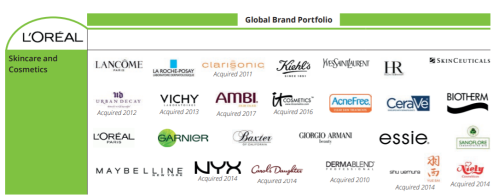The overall skin care market growth is characterized by the rapid emergence of new brands, new geographies, new subcategories, all coupled with worldwide acceptance and adoption of digital technologies. But at the company level, this growth is constantly challenged by trending new concepts and technologies of marketing and distribution of products. As a result, traditional brand strategies have given away to adapt to the new consumer requirements.
Brand power is now grappling with new changing realities. The scale of business and the distribution management is facing a tremendous challenge by the explosion of online sales, the emergence of specialty stores and brands with capabilities to disrupt the market. Small innovation or slight modifications that were earlier the major success driving factors for big established corporate brands are strongly challenged by disruptive innovations of challenger brands leading to the rapid demise of sub-category lifecycle. Conventional strategy for all leading brands was to be present in maximum categories – being ‘everything to everyone’. This business model is rapidly collapsing due to the fragmentation of markets as the consumers are picking the best from each brand and mixing them all. Most importantly, the new age marketing has to accept and embrace the explosion caused by the burst of digital technologies. Today consumers love to follow and believe online opinion sharing, rating, and influence from a diverse group who create a connection between brands and them through social media. Another very significant sea change in the skin care market is moving to ‘organic’ or natural ‘products’ which has become ‘The Trend’ that is mostly promoted by the upcoming challenger brands.

Source: prweb.com
The leading skincare brands are increasingly responding to these changes majorly by investments, mergers, and acquisitions, or creating new product lines in order to accelerate growth. This seems to be a work in progress for many brands, but the leading brands are doing it actively. They have become aggressive on creating cleaner options and make natural products more accessible than ever.
Skincare earlier used to be an extension to fashion, now it is predominantly becoming the extension of personal health care. For any skincare product, the existence of only two or three options is taken over by the availability of several choices that too from great brands that offer the best quality and varieties. This trend of being natural in the skin care market was first started in the food and health space which has eventually rubbed off on skin care and beauty products. This viewpoint was brought up by Stacey Goldstein, director of Garnier skin care marketing. The biggest reason for all the leading brands to ride in the wave of ‘making natural and organic’ products is the increase in the emergence of ever-growing mega-retailers like Nordstrom, Sephora who offer natural products as the demand from consumers is very much on the rise. To begin with, the leading companies such as P&G, Estee Lauder have either invested in or acquired in clean brands considering the fact that their existing production facilities just cannot switch to the different natural ingredients immediately or remove existing ingredients. However, their arch rival company namely Unilever has invested its own resources and started to manufacture cleaner products from scratch as they anticipate the revolution the ‘green wave’ is going to bring. Their in-house brands have started to create new skin care lines with launches planned in years to come. Every big player in the skin market realizes the awareness of their consumers’ knowledge by their increasing label reading habits and the level of information they have. They are accepting the sophistication and the involvement of their buyers as their awareness in knowing the ingredients has grown multi-fold. Today’s buyers are more conscious of the products and ingredients they are consuming than ever. The phrase ‘making better choices’ is now no longer limited to food and health but it is becoming the phrase also for the skincare industry as the demand to know ‘what’s in the product’ from the consumers has risen tremendously.

Source: Deloitte market research
Since the bigger brands are increasingly challenged by the growing list of challenger brands offering green and vegan products, the bigger brands are also making efforts to either take over the smaller worthy brands or they are themselves debuting with cleaner products leading to availability of choices everywhere from grab and go drugstore or pharmacies, special boutiques and to a great extent also department stores. Over the past few years, niche brands such as NYX, Glossier have been become the trendsetting brands, encouraging more M&A from global brands as they seek to acquire small yet successful players to either bridge their portfolio gaps or fill new categories or meet the demands of the trends.

Source: Deloitte market research
Some of the recent significant acquisitions have been by L’Oréal purchasing NVX and IT Cosmetics or Estée Lauder’s purchase of Becca & Too Faced. Over the last few years, acquisitions of emerging skin care brands by global players are on a tremendous rise reflecting the preference for skin care’s higher profit and growth margins and the market potential. Of late, Unilever has been the most acquisitive brand of the leading companies by the number of acquisitions in the skin care market by acquiring brands like Dollar Shave club, Dermalogica and so on. Other predominant purchases in the skin care industry have been seen from Estée Lauder and L’Oréal. Although there have been massive investments by some leading companies on innovation and introduction of new skin care product lines, with 90% of such launches failing within 12 months, the fastest and most reliable route to growth and standing still as a leading brand is an acquisition.
References:
Market research by Deloitte in 2017 on “Shades of success: Influence in the beauty market”, an online report in pdf retrieved from
Rachel Lapidos (December 18,2017) “The skin-care sea change: Inside big beauty’s massive move to non-toxic and natural products”, Well Good (online) retrieved from